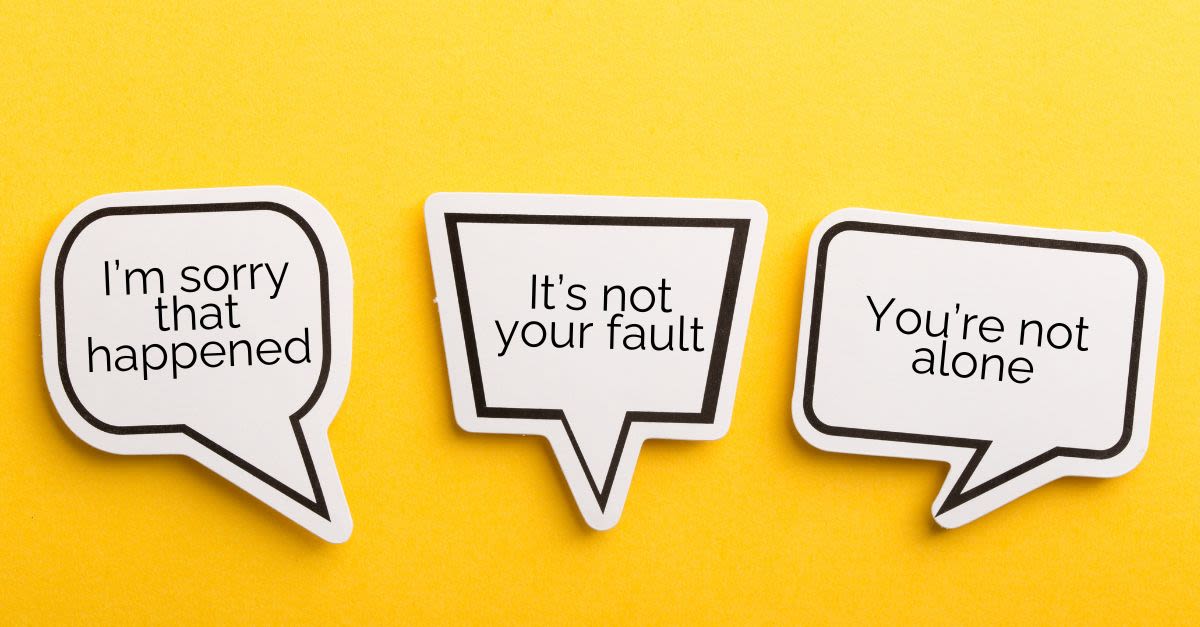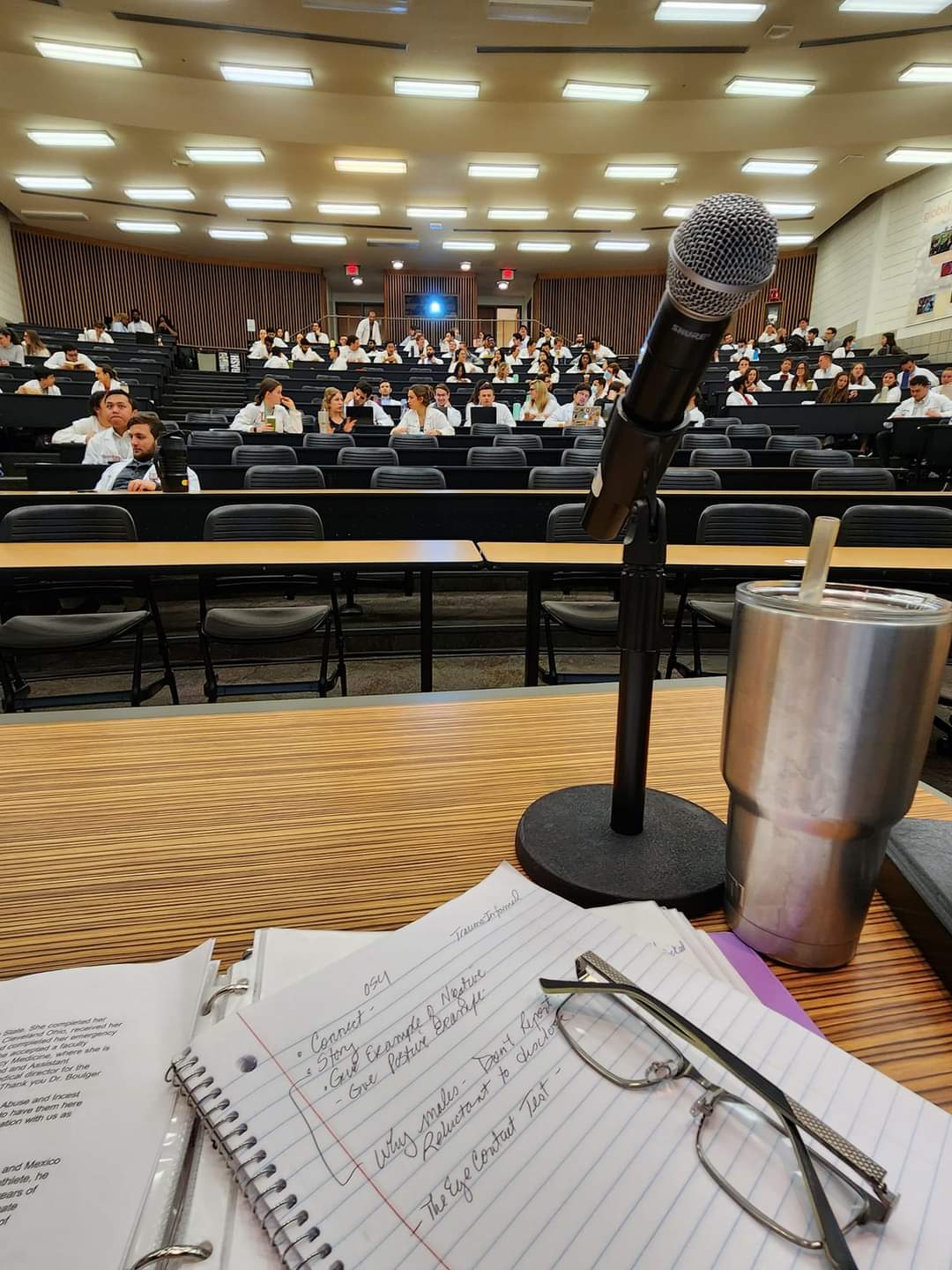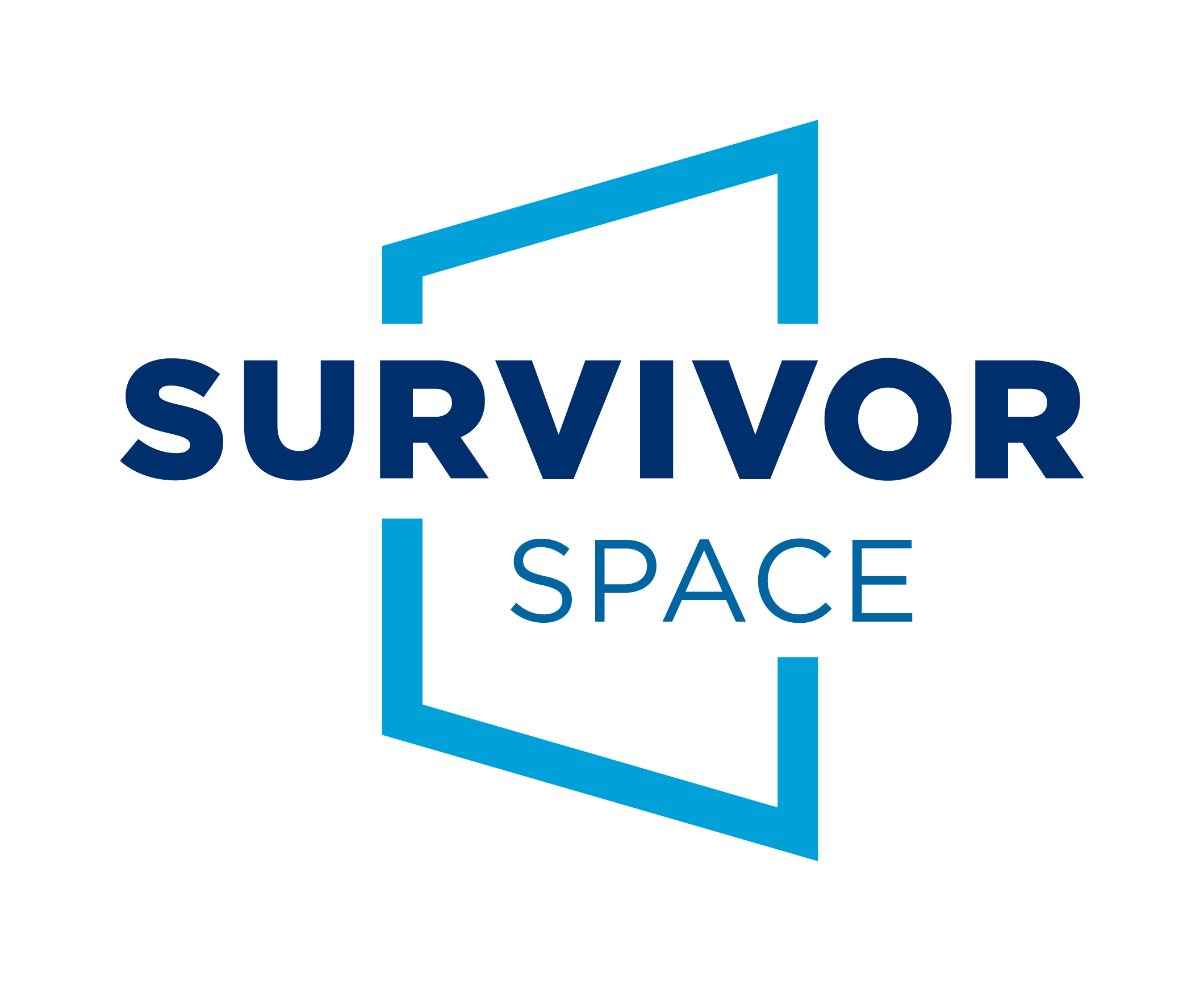The Impact of Common Phrases and Jargon in Supporting Survivors of Sexual Abuse and Trafficking

In the realm of supporting survivors of sexual abuse and sex trafficking, words matter profoundly. Yet, as more attention is directed towards trauma-informed approaches, prevention strategies, and resource allocation, certain phrases and jargon have become fixtures in conversations. But are these phrases losing their potency? Are survivors feeling misunderstood or even disbelieved amidst the repetitive use of seemingly supportive statements?
Consider phrases like "I am sorry you experienced this," "You are not alone," and "It's not your fault." Initially intended as sources of solace and empowerment, these expressions may now risk becoming clichés, uttered more out of obligation than genuine empathy. Have we, as survivors, become desensitized to their intended sentiments, perceiving them as rote responses rather than sincere gestures of understanding. Are these sentences interpreted differently by how someone identifies their gender or sexual orientation?
Registered Psychologist and author of Men Too: Unspoken Truths about Male Sexual Abuse and The Creating Personal Safety Series for Children, Dr. Kelli Palfy stated:
“How statements like these are received may depend on the context. If someone hasn’t given you the opportunity to talk (when clearly you wanted to or needing to), they would come off as dismissive. In this context they may be received as discussion concluding comments. If however, you have given them the time they need and then you make one of these statements, the person may not feel dismissed, but rather supported. However, to make sure, I’d add something like, ‘and we can talk about it more another time if you like.’ How these comments are received would also depend on the person’s support systems. If they feel a lack of support, by itself, saying, ‘You’re not alone,’ may seem to send the message, ‘I have heard this story before, you don’t need to tell me your version of events.’ Though it may be similar to stories you have heard, something like, ‘It seems like this sort of thing has happened to a lot of men,’ may be more palatable since it sends the message it is ok to keep talking, I am listening, and I believe you. It doesn’t seem to say, ‘I know what you went through’ when you really don’t. However, if they do feel well supported, it may be received well.”


Recently, during Ohio State University Medicine Survivor Patient Panel discussion with first-year medical students, the topic of these common statements arose. Many students confessed to being instructed to recite these phrases to individuals they suspect have endured sexual abuse. While their intentions are undoubtedly compassionate, the danger lies in the mechanical delivery of these words, devoid of true emotional resonance.
As a survivor myself, I've pondered whether I've grown accustomed to these phrases, perhaps even dismissing their original intent. Do I subconsciously accept them as obligatory niceties rather than genuine expressions of support? And if so, have they lost their efficacy in providing comfort and validation? Depending on my mindset and the situation, these phrases can cause my stomach to tighten and a confused expression on my face, as if I become more focused on the person’s intention, rather than the proper thing to say.
After sharing my story at conventions or seminars, people want to connect and ask questions, but they tend to start by saying, “I am sorry you went through this,” and after hearing it many times, am I creating a barrier or a numbness to protect myself? Sometimes, I feel these phrases are more for the person saying them than for myself, as usually this statement follows with the person sharing their story. It can become overwhelming because confusion of being the sharer and caregiver blur.
Moreover, have these phrases morphed into linguistic minefields, where missteps can inadvertently offend or alienate survivors? Are they laden with a veneer of political correctness, tinged with trauma informed niceties, or masking genuine connection with hollow rhetoric?
To gain insights, I turn to the voices of survivors, researchers, and therapists who navigate this complex terrain daily.
In a phone interview, I asked therapist Steven Procopio, if these phrases can become a general blanketed statement for survivors? He responded with:
“Here again we are going back to the individual. What I really try to stress is that— survivors are part of a unique sisterhood or brotherhood. When a male survivor comes to me, I don’t think of him as part of a brotherhood. I think of him as an individual. Because his story, or how he thinks, or how it integrated and affected him, is not 100% universal. Every survivor has a different variation of how the trafficking or abuse affected them psychologically. The uniqueness of the individual within the sisterhood or brotherhood is really important. So, for you to hear certain things from certain groups and not others, or variations of the theme, that is their uniqueness. I don’t see them speaking on behalf of the sisterhood or brotherhood as a whole.
“When it gets down to that level, it’s the uniqueness of that specific survivor, they are not representative of the whole sisterhood or brotherhood. They’re in a club as it were, of survivors, like an alcoholic—you’re in a room, you can be a bank president, or a janitor, you’re all the same in that of the brotherhood or sisterhood of the AA., but you’re still unique unto yourself. That is the important thing to remember.
“I hear people say that this is what alcoholics are like, No. this is what you’re like as an alcoholic. Within the trafficking community, I have found that there are a lot of generalized statements made to bring everybody into the loop, when there’s nothing more to bring into the group other than their experience of being a trafficked survivor. You are still a unique person yourself. Everyone has different opinions. And everyone will have different reasons to accept or deny these statements.”

I was very curious as to how other survivors responded to these three simple statements. I was encouraged by how many people responded and transparently shared their feelings. Olympian, athletes, advocators, authors, pastor, speakers, etc. I decided to let their words speak for themselves, the only thing I did was place them in alphabetical order. Here are the questions and responses.
How do you feel when someone says, "I am so sorry you experienced this," "You're not alone," and "It's not your fault"?
These sentiments, while well-meaning, can evoke mixed emotions among survivors. Some may appreciate the acknowledgment of their pain and the assurance of support, while others may feel that these phrases fall short of truly understanding the depth of their experience.

Photo by Martin Sanchez on Unsplash
Photo by Martin Sanchez on Unsplash
Melanie Sachs Barton: “The pity part, ‘I'm so sorry,’ is the hardest part for me to receive. It has been 20 years since my victimization and sorry just doesn't resonate with me, because honestly, I've been able to do so much GOOD on my journey and with my story as a survivor, I don't feel sorry anymore (or never really did) most days since it happened to me. Because, I have been used in incredible ways to help others from the beginning, and that is all I ever wanted if it had to happen, I wanted to use my pain for purpose to help others. I value, ‘You're not alone’ in a positive way. I have heard this statement, most and first, from other survivors in the darkest of days and nights, so it does resonate with me in a powerful way. But I can see the other side, as a survivor hearing, "You're not alone," I would be tempted to say back, ‘But I actually was ALONE when the abuse was happening and felt quite alone in the minutes, hours, and even weeks after it had happened for the first time.’ ‘It's not your fault’ hits me in a completely different way, in the sense of having to really come to terms with this statement within myself at my core, in my own mind, body and soul. It was not helpful to hear this from others, especially early on my healing journey because I was still so stuck in the shame which linked directly to self-blame. So, I needed to free myself, lean into this truth, before I could truly believe it coming from others.
Gina Cavallo: “I hear this a lot and it’s without question upsetting and probably more so when I hear, ‘It wasn’t your fault.’ During another situation, I was told, ‘Well, you can’t blame yourself for the choices you made back then.’ REALLY!!!”
Angie Conn: “This is a layered question, to be honest, for me as a survivor of many types of abuse. What it comes down to personally is the tone, sincerity, and circumstances of the statements. For example, if someone is expressing any or all those sentiments,
1. is it because they are feeling uncomfortable with the content of what I have shared, or
2. maybe it stirred in them something they have tried to or are trying to suppress in some way (either their victimization or perpetration)?
3. Is it because that is just what we say in response?
4. Is it because they feel the need to give a response or "appropriate answer” to what was voiced?
5. Is it because they are uncomfortable with other people's pain because they cannot bear their own pain?
6. Or is it to elevate themselves as at least their pain wasn't as bad as mine, so as a commitment to serving the less fortunate soul, I will "tend" by my response to your trauma?
7. I also believe the not your fault statement leans into the victim-blaming we have become accustomed to in our society.
Kelly Gee: “My view on these statements has changed considerably from when I started my work as an advocate. While I do feel a sense of appreciation that someone is trying to relate to a survivor or community of survivors, I have also come to believe that these sentiments come from a place closer to victimhood than survivorship. Something really only a survivor or a trauma informed individual would understand.”


Photo by Kenny Eliason on Unsplash
Photo by Kenny Eliason on Unsplash
Dr. Viktor Paul Giangrasso: “To me these three statements are very dependent on the intentions of who is speaking them and can be context specific. ‘I am so sorry you experienced this,’ works if the energy is from compassion and not obligation. As a survivor myself, I am quite in tune with what a person’s intentions are from tone of voice, level of eye contact, and body language. ‘You are not alone’ can feel minimizing as a stand-alone statement. It is empowering only if followed with, ‘I had a similar experience and I am willing to share if that would provide support.’ Otherwise, I don’t feel it is helpful. ‘It’s not your fault.’ carries the assumption that the survivor believes it is their fault. I would only say this to someone who clearly communicated that they felt it was.”
Brandon Green: “If someone genuinely said the phrase from their heart, I would appreciate it. If it came across as disingenuous, I would not appreciate it.”
Wendy Jensen: “My first reaction is that these comments immediately separate the listener from the speaker. In other words, suddenly, as a survivor, I feel even more alone, almost stigmatized, made different, set apart because of my experiences. It's not a good feeling -- it's a signal, for me, to end the conversation and move away (which I'm guessing might actually be the intent of the speaker).
“I KNOW it's not my fault, who would bring up the idea of responsibility? This is only appropriate in the context of a therapy session where the patient is deeply struggling with a sense of guilt that they can't escape.”
Gigi Kilroe: “I actually appreciate when someone responds like that.”
Dale Lykins: “While I understand someone’s needs to respond to hearing about my childhood sexual abuse in ways that feel comforting to them, the reality is these phrases make me feel dismissed in a way. They are inauthentic. It seems as if the person attempting to offer care really doesn’t understand the complexity of the effects of abuse. They may be trying to help themselves feel better more than the survivor.”
Mandy Meloon: “It honestly depends on who I am sharing my story with and the context. If I am triggered or in a panic mode, I do not find it helpful at all. Not because of what is being said. Usually the person is uncomfortable, avoids eye contact, will change the subject because they don’t understand, or what you are saying is just too horrifying. It makes me wish I never answered honestly when I am asked, ‘If I’m ok to share my story.’”
Becky Perkins: “I have felt different about these phrases being said to me at different points in my healing journey. I did not disclose until I was an adult, many years after my victimization. When I did disclose, I felt very vulnerable and was seeking acceptance, or validation, from others. So, when I first disclosed and for a while afterwards, these phrases were comforting to me, especially if they were said sincerely. Today, I don’t find them to be especially comforting or helpful.”
Why do you feel that way when you hear those sentences?
Survivors' responses vary based on their individual journeys and support networks. For some, hearing these phrases reaffirms their sense of worth and resilience. However, others may find them superficial, lacking the nuance and validation they crave.
Melanie Sachs Barton: “Because survivorship is each survivor's individual journey and I think at various times on my journey I could feel differently about each of these sentences because HEALING IS NOT LINEAR.”
Angie Conn: “If it is sincere, heartfelt, and appropriate in the context, I feel heard, seen, validated, listened to, cared for, and thankful for the person. However, if it is because of any of the previous intentions I mentioned in the prior answer, I can pendulate between sadness, regret for sharing, feeling ashamed, humiliated, angry, losing hope of others ever getting the point and wisdom of why behind my share, and grief for my past and present self. Sometimes, we only want others to sit with us in our sharing, not fix, speak, or do anything else. This is an excellent example of the empathetic listening I use when training Social Workers to listen to foster youth.
Kelly Gee: “I have said these myself! Especially early on when I was just coming forward with my story and experiencing all this emergence for the first time. But at that point, I was still very much in a place of feeling like a victim and misunderstood. It didn’t take long before I realized how not alone, I really was. A reality that is in many ways more heartbreaking than healing. I don’t believe there is anything wrong with supporting people and feeling ‘this way’ about their experiences, compassion is a gift I hope we all chose to give. But it is important to understand that survivors don’t want to be put into this box over and over again; it’s almost like going back to the beginning of their journey. Being progressive with your thoughts and feelings is one of the most beautiful parts of growth, so please consider that framework when discussing trauma and experiences with survivors. What’s next, not what was…
“Oh yes, these statements have been said to me many times. I want to stress again, these were not re-traumatizing for me (honestly there were times I have been more annoyed than anything, unfortunately). I think these statements often come from a place of genuine care and concern from most people - expecting people to be trauma informed enough, at this point, to understand differently, is asking a lot. That said, we are a culture that is growing and becoming more informed and aware. With communication and education such as this, I think these types of engagements will mature and grow from here.”


Photo by Szabo Viktor on Unsplash
Photo by Szabo Viktor on Unsplash
Brandon Green: “Granted I have thicker skin than most, but these do not automatically annoy or offend me. If it comes off as a platitude, it is annoying or offensive.”
Wendy Jensen: “I might have already answered above....feeling set apart, suddenly feeling almost belittled....especially the more I learn the percentages of how many people have had adverse childhood experiences, oh my goodness. I heard all of them.....the worst type of this kind of sentence was, ‘Oh, I see -- damaged goods.’ I know the words are different, but my reaction isn't that different. That says a lot, I think.”
Gigi Kilroe: “It feels like they are truly expressing some empathy for what I have experienced.”
Dale Lykins: “The person saying those phrases likely does not know me. I was actually alone. I had no adults in my life who were watching out for my best interests. There was no one to turn to. Consequently, I relied on myself to make it through. I developed ways to cope. I was resilient, even as a young child. Nothing I went through was my fault, but fault wasn’t what I dealt with. It was shame.”
Becky Perkins: “I am in a much healthier space today than even just a few years ago, so today, I find these phrases – when said to or applied to me directly – to be kind of irritating. I don’t so much mind 'I am so sorry you experienced this.' (I’m not seeking sympathy, but this still seems to be an appropriate thing to say). But the phrases 'You’re not alone' and 'It’s not your fault' strike me as almost patronizing at this point in my life. By now, I know that I’m not alone and that it’s not my fault. I don’t need to be told those things. But I also realize that some survivors need to be reminded of these things, sometimes for the rest of their lives, which is okay, and someone who doesn't know me well can’t read my mind."
As a survivor, what would you want someone to say to you?
Survivors emphasize the importance of authenticity and empathy in communication. Rather than relying on canned phrases, they value genuine listening, validation of their emotions, and offers of tangible support.
Melanie Sachs Barton: “I believe you; I support you; I'm with you no matter what the journey looks like or if it stays the same or changes tomorrow or if it takes a while. I'm here in solidarity. Solidarity has been crucial for me.”
Angie Conn: “I don't think people always need to respond in words, sometimes saying, ‘I don't know what to say,’ ‘I need you to know I am here,’ ‘May I sit with you in this for a moment,’ ‘What do you need or hope for,’ and ‘How can I support you?’”
Kelly Gee: “‘How are you?’ is my favorite question to ask and be asked. Giving someone the opportunity to share, be heard, ask questions of you, etc. is a really powerful and rewarding thing! With that being said, consider keeping it simple, lead with your ears and eyes, people with lived experience just want to know they are cared for enough to be heard and seen. ‘Tell me about what’s new’, ‘Is there anything I can do or support,’ simple and honest connection is fuel for a survivor’s soul.”
Dr. Viktor Paul Giangrasso: “A present, compassionate, and curious person makes all the difference. If the words come from this energy, the words themselves mean less. A dialogue that consists of kindness, openness, and genuine concern provides empowering support. I don’t find these three statements in themselves unhelpful as long as the energy is supportive and not about covering up personal discomfort about the subject or feeling obligated to say something. Depending on the level of comfort in the relationship, I find ‘I am here for you,’ to be quite helpful.”
Brandon Green: “I would appreciate people speaking from their heart. It’s always nice to hear someone’s genuine positive thoughts towards you. ‘I’m proud of you and what all you have endured.’ ‘Wow, it’s incredible what all you have endured. I am in awe of you. Keep up the good work!’ ‘Geez, that’s a crazy story! You’ve been through so much, and yet, look at you now! I’m so proud of you and what all you’ve been through!’ ‘Dang! You are a champ. I bet you make hell nervous.’”


Photo by Tim Mossholder on Unsplash
Photo by Tim Mossholder on Unsplash
Wendy Jensen: “‘I can't imagine what that must have been like.’ ‘Beyond listening, lending my ear and my heart, my friend, tell me what I can do to help.’ ‘You are an amazing person and I'm proud to know you.’ ‘If you want to, tell me more. I am here with you.’"
Gigi Kilroe: “I think now because I have come so far along in my journey, I truly, truly do appreciate it when someone says not only ‘I am so sorry you experienced this’… But ‘I think it’s wonderful that you’ve been able to take what you have been through and are now able to help others.’”
Dale Lykins: “I want someone to say to me, ‘What you experienced was terrible. No one should ever go through that. You were so strong. I am so glad you made it through.’”
Mandy Meloon: “Not everyone is equipped to handle or hear such trauma or heavy emotions. It has taken me a long time to find really safe people I can communicate with and to be ok when they are not. When a person recognizes that I am not ok and just lets me be and express how I’m feeling in the moment with no judgement. Most of the time I am suffering in silence, and I just want to appear normal and not freak people out. Those who are survivors of trauma can relate.”
Becky Perkins: “Whenever you’re speaking with someone about something difficult – sexual assault/abuse or the death of a loved one, for example – I think there is power in acknowledging that there are no words that can adequately convey the true awfulness of it, and that sometimes, what we need most is for the person in front of us to just be present and not speak at all. So, for me, I think what is most helpful is something like, ‘I don’t know what to say, other than I’m sorry this happened. If you want to talk, I’m here to listen.’ I also appreciate it when someone thanks me for trusting them to disclose, because revealing that about myself is a sign that I trust them and value their connection with me.”
Is there a difference when a friend or another survivor says, "I am so sorry you experienced this," "You're not alone," and "It's not your fault" as opposed to a medical or law enforcement professional? Why?
The source of these statements can significantly impact their reception. When expressed by a friend or fellow survivor, they may carry more weight due to the shared understanding and camaraderie. Conversely, when uttered by professionals, such as medical or law enforcement personnel, they may feel more perfunctory, lacking the personal connection and context that survivors crave.
Melanie Sachs Barton: “Yes, there is a level of trust with a friend or especially another survivor that is unmatched. A professional relationship needs to gain a certain level of trust before these sentences really mean anything (that is my experience both as a survivor and as an advocate/professional working in the field with survivors for the past decade).”
Angie Conn: “Absolutely, again, context, intention, and impact. I have never had another survivor use or say those statements. It is often an unspoken understanding through a look or body language that is impactful and more meaningful than words. As a survivor of CSA and other trauma, words fall short. They are empty in some circumstances, especially with medical professionals and LE, because of many failures as a child, teen, and young adult. So, actions are way more impactful in those cases.”
Dr. Viktor Paul Giangrasso: “When power dynamics come into play, law enforcement and medical professionals must be aware of the responsibility they hold in their position of authority. Again, it comes down to intention and delivery. Genuine kindness cannot be faked. It must be felt. Friends who have not gone through a similar experience can offer a non-judgmental ear but must be careful to avoid assumptions and maintain healthy boundaries. I believe it is safest for these three statements to be reserved for survivors who must also be mindful of personal intentions, context, and energy of delivery.
Brandon Green: “Because of my associated guilt and shame from making poor decisions and my involvement in the blackmarket prior to becoming a survivor of human trafficking, I would consider it potentially very impactful for a law-enforcement officer or some health care professionals say to me, ‘I’m so sorry this happened to you. Just so you know, It’s not your fault! And you are not alone.’”
Wendy Jensen: “I have to say, ‘Yes.’ I know that that survivors understand. And they are with me, so I'm not alone. As opposed to a medical professional, they are not WITH you, they are referring to some invisible unknown entity that's with you. The survivor knows whereof they speak (I'm not sure about a friend. A very close friend would be OK, but even some friends saying this would be off-putting) it's something about knowing that the other person has had similar experiences that makes it OK.”


Photo by Briana Tozour on Unsplash
Photo by Briana Tozour on Unsplash
Gigi Kilroe: “It truly means more to me when I hear those things from a friend or a fellow survivor. Unfortunately, I had a negative medical experience after my rape in college… The first doctor that I saw was very cold, and that whole experience made it just so much worse. Thankfully the nurse in the emergency room escorted him out and brought in a different doctor. The second doctor was very kind. But the experience with that first doctor definitely added to the trauma.”
Dale Lykins: “Yes. Another survivor likely knows all the aspects of the abusive experience. They are aware of the grooming and the manipulation that is part of the relationship between abuser and victim. They know firsthand the power difference that exists. Another survivor has the right to speak in such knowing intimate ways because they do know.”
Mandy Meloon: “It is the sincerest for me when another survivor says these things to me. This isn’t a club you want to be a part of. They understand because it happened to their mind, body, and spirit too. Some things you can have empathy for and others you cannot truly understand unless it is experienced. Survivor to survivor support is vital for me. A lot of the time I feel people, even with the best intentions, are just trauma tourists. I’ll give you an example. I feel like when people ask what happened to me or I tell them my story, it is like a car wreck. They have the best intentions of not only helping but being the hero. They pull out a body and it’s in pieces. They wished that they had never stopped at all. That’s the look in most people’s eyes when all I have said was that I was raped as a child. When I see this, I want to save them from ME. It immediately reverses into me taking care of them because they made my trauma about how they couldn’t handle it. I’m taking care of you now and I feel even more shame because I am not like ‘normal’ people. It is exhausting. At 43, I learned to keep my check-ins with trained professionals and really safe people.”
Becky Perkins: “The short answer: Yes, there’s a difference. I would expect a friend (who knows me) to use more nuanced and personalized language with me than someone else would. I would expect another survivor (whether they know me or not) to use language conveying that they ‘get it’ to some extent. And I would expect a professional (who doesn’t know me at all) to use more general phrases like these.
"The long answer: I am a professionally trained victim advocate. When I went through training (more than 20 years ago), I was taught to say these exact phrases. ‘I’m so sorry’ is meant to convey empathy for what the survivor has been through, and ‘You’re not alone’ and ‘It’s not your fault’ are meant to proactively address two very common and very real fears/concerns that survivors have, especially if they were recently victimized. I think these phrases are generally okay to say in situations where the professional has very little context to work from and/or will be interacting with the survivor for a brief period of time. But I think the most helpful way to approach these issues – whether the person is a friend, another survivor, or a professional – is to read the room, so to speak. Pay attention to what the survivor is telling you and how they are saying it. For example, if the survivor is expressing anger at the offender for what they did, then they probably don’t need to be told, ‘it’s not your fault’ in that moment. Pay attention to the survivor’s energy, the phrases they are using, and their body language. And if you say something that the survivor doesn’t like, quickly and sincerely apologize, then move forward.”
Researcher Ena Lucia Mariaca Pacheco:
As I gathered data for my research, exploring the question "what was most helpful and harmful to your healing journey," understanding what genuine support looks and feels like emerged as a central theme. After years of engaging with survivors of various forms of violence, a pattern in giving and receiving support became evident to me.
When someone offers phrases like "I am so sorry you experienced this," "You're not alone," and "It's not your fault," the impact can vary widely depending on the context and the individual's current state of mind. While these words can offer comfort and validation, they can also trigger negative emotions, particularly if past experiences with similar sentiments were insincere or dismissive.
For many, hearing such expressions acknowledges their pain and assures them of solidarity, potentially easing feelings of guilt or self-blame. However, for others who have encountered insincerity or dismissal in the past, these words may evoke frustration, anger, or deeper pain. The effect of these phrases differs from person to person and situation to situation.
It's crucial for both parties—the person seeking support and the one providing it—to recognize that clear communication is essential for the healing journey. Those seeking support should establish expectations before initiating conversations. For instance, asking the listener if they're emotionally prepared for a difficult discussion sets the tone and allows for consent. This helps ensure that both parties are in a suitable emotional state to engage meaningfully.
Once the receiver has consented, let them know what type of support is needed. Do you need someone that you can vent to and just listen to, do you want solutions, and do you just need someone to be by your side? This self-reflection is needed so that before going into the conversation you can guild it in a way that would best support you.
Listeners can offer support by asking, "How can I best support you?" This invites the speaker to express their needs openly, whether they simply want someone to listen or seek solutions.
In emotionally charged situations, it's important to remember that while phrases like "I am so sorry you experienced this," "You're not alone," and "It's not your fault" are intended to provide comfort, they may also trigger negative reactions. Genuine empathy and understanding, demonstrated through active listening and respectful support tailored to individual needs, are invaluable and can help deepen the relationship between the two individuals. All victims and survivors are in need of empathy, kindness and care especially during their disclosures.
Positive interactions where survivors feel believed and accepted mark the beginning of many healing journeys.
“I am so sorry you experienced this,” is important as it helps the discloser not gaslight themselves. Sometimes, we just need to be reminded that yes, we went through something horrible, and we are allowed to feel all those feelings, and that we are not crazy. Self-gaslighting is a very common practice to “get over” a traumatic situation, however, it does not help with healing in the long run. Therefore, having a friend who is willing to just sit with you and tell you, “I am here, and I’m sharing your pain,” is a moment that can support the healing process.
The phrase “You’re not alone” is interesting, because most victims may roll their eyes and say, “Yeah, I know,” but it is so important to remind them of this, with examples, because of all the years of feeling isolated and shamed will cause an immediate reaction that pushes others away, but the reality is “you are No longer alone.” However, this sentence needs the person saying those words to actively stay in the survivor’s life and continue to engage with them. Saying you are not alone, and then leaving someone in a vulnerable situation will only further disintegrate trust. Many abused and exploited survivors grew up feeling alone and isolated, especially the longer they don’t speak about it, suppressing their reality, their story, and their symptoms. This is why listening to stories of others sharing their trauma is important, to come to terms with your own story.
Additionally, “It is not your fault,” holds its foundation in emotions rooted in shame, guilt, and memories of perpetrators isolating you, and telling you, “If you tell anyone I will hurt you or them, no one will believe you, and no one would love you again if they only knew.” It takes a lot of self-love and healing to accept that the reality was, whatever happened when you were a child, you could not have thrown off a grown adult from your small child body. You could not have run fast enough, fought, screamed more or louder to have stopped whatever happened. Something horrible happened once or many times, but it was never your fault, and yet, many survivors live with this shame and guilt that is never theirs to hold. However, this leads to these important connection words to turn negative and triggering.
If these phrases are triggering, it could mean two different things, 1) the person saying these words are using an insincere or dismissive tone and body language that you immediately catch that leads to very normal negative human reactions to a false connection comment. However, if said with good intension and proper follow up, it could lead to a reflective moment (why am I annoyed or have anger at this empathic comment). 2) Triggers on comforting words can stem from adverse childhood experiences, bringing up memories of those that should have cared for and comforted you, when in reality hurt you. This avoidant reaction can stem from the inner monologue reaction of “I can’t trust anyone,” or “Does anyone love me?” It could come from wishing someone had asked if you were okay sooner, or that no one followed up after they have. However, if the individual you are disclosing to is honestly open to listening and caring about you, it is important that self-sabotaging triggers don’t completely stop these interactions.
For survivors that feel triggered by these words, I am truly sorry that you had to go through something so painful that you feel that these words trigger and cause you more pain and suffering. I wish that you had someone that took care and loved you properly when you were a child. Please know that as friends and frontline professionals we want to support and help, but we need patience and to understand you. If you need a moment, just let us know, you can say, “Are you in the space to actively listen? I need support,” may help re-set a situation that feels robotic and insincere.
In my master’s thesis, according to the 40 survivor answers, to go forward into healing a survivor needs to first recognize that a trauma experience happened, not minimize their story to themselves or continue to suppress any emotions, thoughts, or memories of their abuse/exploitation.
After survivors begin the process to understand more about what happened, they can start to make community with trusted peers that support them, eventually leading to mental and emotional support from trained professionals. Finally, treating various aspects of their trauma, such as addictions and complex-PTSD. This healing can then allow for relationship building, and seeking what brings them joy, these last steps allow for the survivor to live in greater freedom and happiness (p.117).
The first positive interaction in which a victim felt believed and accepted, was when many survivors reported their journey to healing began (p.118).
A quote from my research comes from a CSEA Survivor Participant, they stated (p.118), “Being believed today has helped inspire me and provide me with a small sense of closure and peace. However, today was merely the tip of the iceberg for this new chapter of my life. It feels like the more you share, the more you realize that we are not alone and it’s not our fault.”
The male survivors in the study “The Needs and Stories of Male Survivors of Child Sexual Abuse, Exploitation and Human Trafficking,” stated what would be helpful for friends and family to ask.
· When they are ready to talk, listen to understand, and believe them. You can say “How can I help you?”, “what can I do to support you, in a way that you would feel supported”.
· Ask “do you need to vent and someone to just listen, or solutions and action?”
· Do not cut off your relationship. Treat them as a human being with kindness and respect– don’t just see them as a victim.
The next steps for victims/survivors:
· Find a community of fellow survivors. There are online chat forums to safety interact with other survivors anonymously such as MaleSurvivor.Org.
· Start sharing your story – once you feel ready to trusted people.
· Find a trauma-informed therapist/councilor with experience in child sexual abuse. Ask questions to ensure that they suit your needs. You can ask their religious affiliation, if they support LGBTQAI2S+, if they have expertise in child sexual abuse.
· Seek other forms of healing for a more holistic approach. There are online and in person healing retreats, online educational webinars, videos on past events, live events for story sharing.
Survivors' next steps often involve finding supportive communities, sharing their stories, seeking trauma-informed therapy, and exploring holistic healing approaches. However, it's essential to acknowledge that the impact of supportive words may vary depending on who says them. While friends or fellow survivors may offer more empathetic support, professionals can still provide meaningful assistance, albeit with potentially different levels of personal connection.
It is important to guild an individual to seek specialized and tailored support when it goes above the capacity of friendship. Encouraging individuals to seek specialized support when necessary is crucial. While friends and chosen family offer valuable support, professional help may be needed for more complex issues. Additionally, establishing boundaries to protect friendships from emotional overload is also important.
A quote from my research comes from a CSEA Survivor Participant (p.118), "Why was he able to provide me with the best one-on-one therapy to date? It’s because he was “real.” You could feel he genuinely cared about the person he was speaking with. Rather than assigning me a number and an hour-long appointment, he treated me as an equal, as a fellow human being." – CSA Survivor Participant
Trauma-informed professionals who create safe spaces for disclosure and demonstrate respect and acceptance play a vital role in this process.
Ultimately, the take away from all this should be, when offering support, genuine empathy, active listening, and unconditional support are essential.
It's crucial to mean what we say, actively listen to stories, and offer genuine support to those in need. For survivors triggered by supportive words, understanding and patience are key. As friends to frontline professionals, we strive to support and help, but we also need to respect survivors' boundaries and emotional readiness.
We can all self-reflect and think back on what we wish we had in those vulnerable moments as children.
With that in mind, be the hero you wish you had when you were a kid, to yourself and others.
Ena Lucia Mariaca Pacheco (November 2022). The needs and stories of male survivors of child sexual abuse, exploitation and human trafficking. VIURRSpace. https://www.viurrspace.ca/items/eddec7b0-c358-45c3-9efe-f2f6fdfc84bb
In the ever-evolving landscape of survivor support, it's imperative to recognize that words alone cannot fully capture the depth of survivors' experiences or address their multifaceted needs. While phrases like, "I am sorry you experienced this," "You are not alone," and "It's not your fault," were initially intended as beacons of empathy and solidarity, their repeated use risks relegating them to mere platitudes.
Survivors, researchers, and therapists alike acknowledge the inherent limitations of these phrases in encapsulating the complexities of trauma. Each survivor's journey is unique, shaped by a myriad of factors including cultural background, support systems, and coping mechanisms. Thus, a one-size-fits-all approach to survivor support is inadequate and may inadvertently exacerbate feelings of isolation and alienation.
To truly support survivors of sexual abuse and trafficking, we must move beyond the confines of scripted responses and embrace a more holistic and individualized approach. This entails active listening, validation of survivors' experiences, and a commitment to providing tangible resources and support. Moreover, it requires a willingness to engage in difficult conversations about power dynamics, systemic injustices, and the pervasive impact of trauma on individuals and communities.
In essence, survivor support is not just about saying the right words; it's about creating spaces where survivors feel heard, valued, and empowered to reclaim their agency and narrative. It's about fostering genuine connections built on trust, respect, and mutual understanding. And it's about recognizing that true healing is a journey, not a destination, and that survivors deserve compassion, dignity, and justice every step of the way.
As we navigate the complexities of survivor support in an increasingly complex world, let us heed the voices of survivors, researchers, and therapists, and strive to cultivate environments where empathy, authenticity, and solidarity reign supreme. Only then can we truly fulfill the promise of healing and transformation for survivors of sexual abuse and trafficking.

Contributors
Melanie Sachs Barton: https://linktr.ee/speakourvoice
Gina Cavallo: https://linktr.ee/ginacavallo
Angie Conn: an independent consultant and Advocate and I work in the field of anti-trafficking, (16) Angie (SheWhoDares Consulting) Conn | LinkedIn
Kelly Gee: Executive Director, Survivors for Change www.SurvivorsforChange.org
Dr. Viktor Paul Giangrasso: Child Wellness Advocate. https://viktorpaul.com/
Brandon Green: https://www.facebook.com/brandon.andres.green/
Wendy Jensen: DMV, https://www.linkedin.com/in/jensenhomeopathy/
Gigi Kilroe: From Within | (gigikilroe.com)
Dale Lykins: Author and Speaker. www.dalelykins.com
Mandy Meloon: (29) Mandy Meloon | LinkedIn The Cost of One Olympic Sexual Abuse Survivor’s Fight for Justice - Ms. Magazine (msmagazine.com)
Ena Lucia Mariaca Pacheco: https://linktr.ee/enaluciamariaca
Dr. Kelli Palfy: Registered Psychologist and author of Men Too: Unspoken Truths about Make Sexual Abuse and The Creating Personal Safety Series for Children,: https://www.amazon.com/author/drkellipalfy www.kellipalfy.com
Becky Perkins: NACP Credentialed Advocate. https://www.linkedin.com/in/beckyperkins/
Steven Procopio: www.stevenlprocopio.com

About the Author:
John-Michael Lander is a Survivor, Advocate & Public Speaker
He is also the founder of An Athlete's Silence: www.anathletessilence.com

Published by SurvivorSpace, an initiative of Zero Abuse Project
